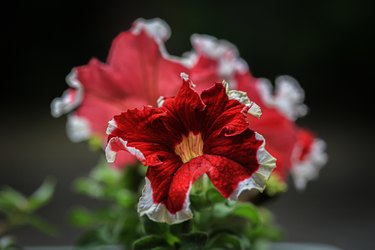
One of the more curious facts about the genus of petunias (Petunia Juss) is that tomato, potato and tobacco are also members of the same family, Solanaceae. However, the popular plant, petunia, stands alone as the named base of a great variety of these colorful and ever-expanding groups of the easiest flowers to grow from seed. As long as they have ample sun, these Argentine natives bloom from spring through fall, even in mediocre soil.
Through years of hybridization, four distinct types of petunia have evolved: the Grandiflora, Multiflora, Milliflora and the Wave, the spreading types that are popular as ground cover. Petunias are perennials, although they are usually planted as annuals, growing in the warm climates of USDA hardiness zones 10 to 11.
Video of the Day
Video of the Day
Petunia Seed Planting Instructions
The seeds of the petunia are extremely tiny, making planting them challenging. It is suggested by the University of Minnesota that planting take place indoors in early spring, enabling a greater variety and quantity of the flowers, and giving the seedlings enough time to grow before transplanting. Avoid handling the seedlings by planting the seeds in an end-use container or one that allows substantial growth before transplanting. Prepare the soil by adding a time-release fertilizer and making sure you use a well-draining combination of soil and compost, or a soilless combination. Clay soil is not recommended.
Spread the seeds across the top of the container and gently press until they are incorporated into the soil.
Press down with your fingers and then mist the soil lightly.
Cover the container with plastic wrap and place it in a sunny spot, but not in direct sunlight.
In seven to 10 days, the seeds should germinate.
When petunias germinate, remove the plastic covering, move the container to a cooler spot and be sure the environment temperature ranges from 65-75 degrees Fahrenheit for optimal growth.
Caring for Petunia Seedlings
As the tiny seedlings grow, they should be under a fluorescent light for 16 to 18 hours each day. Make sure they are at least 4 to 6 inches away from the light and watch as leaves develop. When at least three leaves have formed on each seedling, you can start feeding them diluted liquid fertilizer.
If you plan to transplant your seedlings, start by hardening them off, meaning introducing them to the sunny outdoors for a few hours every day, then bringing them back indoors for the night. The same holds true for container petunias that you plan to place outside your home. Both need a considerable amount of water as they develop, with container petunias needing watering almost every day. A slight droop indicates they are thirsty.
How Long Before Petunias Bloom From Seed
If you've followed the steps carefully from seed to seedling, and your petunias look healthy enough for planting in the garden, do so carefully, not disturbing the roots. Once accustomed to their new environment, it will take a few weeks before the seedlings grow strength and start to bloom. Flowers should appear in six to eight weeks. Monitor the growth rate and when they are strong enough, move them about to give them ample room for growth, making sure that sunlight reaches all of them during the day.
The warmer the climate, the faster the flowering. For best results, provide them with long, warm days and evenings that are mild. If a frost warning occurs, cover the flowers to keep them warm. In the fall, petunias start to die off but return again in the spring in year-round warm climates, although they are grown as annuals in most USDA hardiness zones. In these zones, their life span averages three to four years and they will flower for 12 to 18 months.